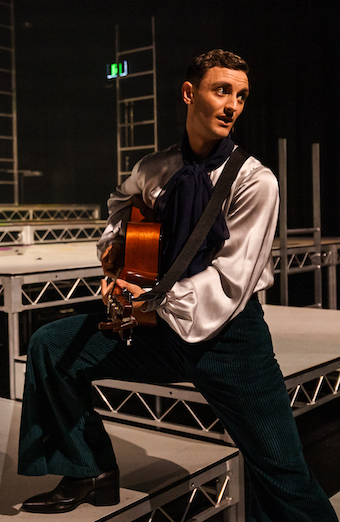Graduating WAAPA students handle Brecht’s masterpiece, The Caucasian Chalk Circle, with fabulous gusto and conviction, David Zampatti writes, and he gives them a resounding “wow!”
It’s Brecht done very well
28 March 2021
- Reading time • 6 minutesTheatre
More like this
- Just what the doctor ordered
- Lifting the weight of the world
- Gentle touch guides lunar landing
The Caucasian Chalk Circle, Western Australian Academy of Performing Arts (WAAPA) ·
Enright Studio, 27 March, 2021 ·
Bertolt Brecht’s work, done well, is a wonderful thing, full of humour, anger, inventiveness and surprise. It’s also purposeful and ageless, a direct challenge to our power systems and our concepts of morality, but also to our idea of narrative, of character, of theatre itself and how we should approach it.
This production of one of his masterpieces, The Caucasian Chalk Circle, performed by WAAPA’s third-year (graduating) performance-making students and directed by Emily McLean, is done very well indeed.
Students in the performance-making course are well suited to Brecht: they are trained in a multitude of disciplines and associated crafts to devise, create and build, operate puppets, act, sing, dance and play in their work. While many have high levels of specific skills, their practice is generalist by nature. In a real sense, that nature is intrinsically Brechtian.

The Caucasian Chalk Circle is an epic parable of love and virtue – “Terrible is the seductive power of goodness” – a play within a play carrying a withering critique of both fascism and Stalinism. Brecht wrote it between 1943 and 45, when both those death machines were in full nihilistic bloom.
An “expert” from the capital comes to an abandoned village to settle a land dispute between fruit growers and goat herders. The villagers have engaged a famous singer (played by Jacob Sgouros) to argue their case, and he tells the story of the chalk circle. In the tale, a serving girl, Grusha (played at different times by Clea Purkis, Beth Wilkinson and Phoebe Eames), rescues a noble baby from a palace during a coup. The child’s father, the Governor (William Gammel), has been killed, and his mother (Eliza Smith) and other courtiers have fled.
Suffering great privations and dangers in the war that follows, Grusha takes the child to safety in a mountain village where she is married off to a dying man (Ben Sullivan) to give her and the baby she claims as her own safety and legitimacy. On hearing that the war is over, the dying man suddenly recovers, and Grusha is trapped in a harsh, loveless marriage.
In a parallel story, and through a comic series of unlikely circumstances, an unruly town scribe, Azdak (Lucy Wong) becomes a town’s judge. He is corrupt, contemptuous of the law as it is writ, but wise and compassionate. It is to him that Grusha and the Governor’s wife are taken to judge who should be the child’s mother. In a famous scene inspired by the story of the wisdom of Solomon, Azdak submits the women to the test of the chalk circle to reach his verdict.
There’s no secret to Brecht’s purpose. We are not to feel attachment to or empathy for his characters, or even an attachment to the narrative. We are “alienated” from these sentimental emotions and free to engage with the “dialectic”, the differing points of view about the play’s subject. This sounds daunting, but Brecht is also funny, bawdy, rough-hewn, slapstick and surprisingly approachable.

This ensemble of 18 performers, playing around 100 characters, is completely at ease with Brecht’s approach, and they attack their work with fabulous gusto and conviction (I worried for their safety as they hurled around the simple set of risers, scaffolding and ladders). They have brought literally hundreds of ideas to the performance, and Emily McLean, who is such a fine director, has mustered them with miraculous skill.
It feels churlish to single out individual performances in such a collective performance effort (and Brecht, I know, wouldn’t approve), but Lucy Wong’s Azdak is flammable, bloody hilarious and precisely what the character needs.
I don’t know whether Jacob Sgouros was born just to play this one part, or whether we’re looking at a star rising here, but he simply nails everything the part offers and more. His singing and guitar-playing are perfect, his acting, his ability to fade back and forward, and the look of him, are spellbinding. Wow!
And that’s a good word to describe this whole, fantastic show.
Pictured top: The Governor and his wife (William Gammel and Eliza Smith) in a scene from ‘The Caucasian Chalk Circle’, performed by WAAPA’s graduating performance-making students. Photo: Stephen Heath
Like what you're reading? Support Seesaw.






